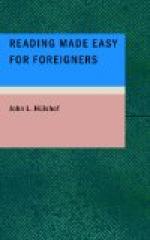LVII. Pictures from American history
LVIII. Thomas A. Edison
LIX. Abraham Lincoln
LX. Address delivered at the dedication of
the cemetery at Gettysburg
LXI. Wages
LXII. Love for the dead
LXIII. Economy of time
LXIV. George Stephenson, the engineer
LXV. George Washington, part II
LXVI. Benjamin Franklin
LXVII. Nobility rewarded
POETRY
Selection.
I. A city
street
II. The
ship of state
III. Be true
IV. Bring
back my flowers
V.
“Old Ironsides”
VI. Treasure
trove
vii. The
heritage
VIII. The star-spangled
Banner
IX. The
sword of Bunker hill
X. The
hunters
XI. My
fatherland
XII. Woodman,
spare that tree
XIII. Prayer in
battle
XIV. The
Retort
XV. A psalm
of life
XVI. The
old oaken bucket
XVII. Oft in
the stilly night
XVIII. The picket
of the Potomac
XIX. Columbia,
the gem of the ocean; or,
red,
white, and blue
XX. Recessional
XXI. Human
progress
XXII. Give me
the people
MISCELLANEOUS
Characteristic of heroism constitution of the united states declaration of Independence freedom of thought useful information wise sayings
REMARKS TO THE TEACHER
Complete answers should be given by the pupils. The simple words “yes” or “no” do not constitute an answer in these exercises; such expressions give no practice in the use of the language.
The teacher should prepare himself thoroughly for each lesson in order to ask many pointed questions relative to the reading matter.
The entire time spent in reading the lesson and questioning the class should not exceed thirty minutes. Too much detail will only confuse and fatigue the pupils. Five or six words that present any difficulty either in spelling or pronunciation may be selected from the reading lesson for dictation. Such words should not be given singly, but rather in short sentences.




